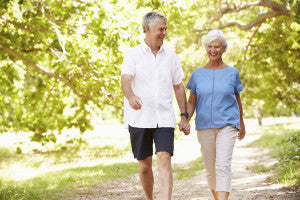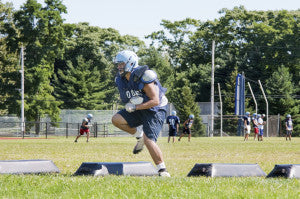The heat dome has dissipated. That doesn’t mean hot weather has ended, however. It’s summer, and in most states in the continental U.S., temperatures will remain in the
80s and 90s during the day. For that matter, another heat wave could easily strike.
Some people are more sensitive to prolonged heat than others. They include children under 4 years old, adults over 65, overweight people, and people who are ill or on some types of medication,
according to the U.S. Centers for Disease Control. Even healthy people can get a heat-related illness if they work or exercise outside for a longer period.
Children

Children are vulnerable for several reasons,
according to the National Integrated Heat Health Information System (NIHHIS), a partnership of federal agencies to reduce heat-based illness and death. Young children’s bodies don’t get rid of heat as efficiently, and they have a higher metabolic rate than older children and adults. Children rely on others to keep them safe because they don’t yet have knowledge or resources of their own.
The U.S. Centers for Disease Control and Prevention lists three ways to protect children from heat-related illness.
- Never leave children in a parked car, even for a short time and even if the windows are open. When the outside temperature is more than 72 degrees, the temperature inside a car increases by 19 degrees in 10 minutes and by 29 degrees in 20 minutes, according to a study published in Pediatrics in 2005. Keeping the windows cracked reduced the temperature rise by just 3 degrees. This year, so far, 26 children have died from heatstroke after being left in cars.
- Dress infants and children in loose, lightweight, light-colored clothing. Remember hats and sunblock.
-
Seek medical care immediately if a child has symptoms of heat-related illness.
Adults Over 65

Just like young children, people over 65 years old can have more difficulty regulating body temperature,
according to the NIHHIS. This can exacerbate many chronic illnesses. One study in New York City found that every degree Centigrade increase caused a 4.7 percent increase in hospital admissions for respiratory illness for older patients.
The CDC has five recommendations for older adults to keep cool.
- Drink cool – not extremely cold – nonalcoholic beverages. Talk to a doctor if you have a restricted fluid intake or if you’re on water pills.
- Take a cool shower, bath, or sponge bath.
- Seek an air-conditioned environment and stay indoors during the hottest part of the day. If you don't have air conditioning, visit an air-conditioned public place like a shopping mall or library.
- Wear lightweight clothing.
- Don’t engage in strenuous activity. Rest when possible.
If you know an older adult, you can help them by checking on them frequently in hot weather, encouraging them to drink if medically permissible and taking them to an air-conditioned place if they have transportation trouble.
Athletes

Fall sports season is beginning. Football season! Student athletes are especially vulnerable to heat-related illness this time of year,
according to the NIHHIS. The NIHIS said every year, about 9,000 high school athletes alone are treated for heat illness, like heat stroke or muscle cramps. Most are football players. Between 2000 and 2013, the number of deaths from heat stroke doubled among high school and college football players.
The CDC makes
several recommendations to protect athletes from heat-related illness.
- Limit outdoor activity, especially midday when the sun is hottest. Schedule workouts early or late.
- Wear sunscreen and loose, lightweight, light-colored clothing.
- Start activities slow and pick up the pace gradually.
- Drink more water than usual, even when you’re not thirsty. Muscle cramps may be an early sign of heat-related illness.
- Monitor a teammate’s condition, and have someone do the same for you. Seek medical care immediately if you see symptoms of heat-related illness.
It’s not too late for all homeowners to prepare for upcoming heat waves.
Ready.gov has some tips. If the home has a window air conditioning unit, make sure it’s installed snugly, and insulate it if necessary. If it has central air conditioning, check ducts for cleanliness and insulation. Tune up both types of air conditioners yearly.
Prepare windows and doors. Weather-strip doors and windowsills to help keep hot air out and cool air in. Use covers like drapes, blinds or awnings to keep out direct sunlight. Or, cover cardboard with aluminum foil or a foil
emergency blanket and install it in a window to reflect heat from outside.
 Katadyn Hiker Microfilter Giveaway
Katadyn Hiker Microfilter Giveaway
 Children are vulnerable for several reasons, according to the National Integrated Heat Health Information System (NIHHIS), a partnership of federal agencies to reduce heat-based illness and death. Young children’s bodies don’t get rid of heat as efficiently, and they have a higher metabolic rate than older children and adults. Children rely on others to keep them safe because they don’t yet have knowledge or resources of their own.
The U.S. Centers for Disease Control and Prevention lists three ways to protect children from heat-related illness.
Children are vulnerable for several reasons, according to the National Integrated Heat Health Information System (NIHHIS), a partnership of federal agencies to reduce heat-based illness and death. Young children’s bodies don’t get rid of heat as efficiently, and they have a higher metabolic rate than older children and adults. Children rely on others to keep them safe because they don’t yet have knowledge or resources of their own.
The U.S. Centers for Disease Control and Prevention lists three ways to protect children from heat-related illness.
 Just like young children, people over 65 years old can have more difficulty regulating body temperature, according to the NIHHIS. This can exacerbate many chronic illnesses. One study in New York City found that every degree Centigrade increase caused a 4.7 percent increase in hospital admissions for respiratory illness for older patients.
The CDC has five recommendations for older adults to keep cool.
Just like young children, people over 65 years old can have more difficulty regulating body temperature, according to the NIHHIS. This can exacerbate many chronic illnesses. One study in New York City found that every degree Centigrade increase caused a 4.7 percent increase in hospital admissions for respiratory illness for older patients.
The CDC has five recommendations for older adults to keep cool.
 Fall sports season is beginning. Football season! Student athletes are especially vulnerable to heat-related illness this time of year, according to the NIHHIS. The NIHIS said every year, about 9,000 high school athletes alone are treated for heat illness, like heat stroke or muscle cramps. Most are football players. Between 2000 and 2013, the number of deaths from heat stroke doubled among high school and college football players.
The CDC makes several recommendations to protect athletes from heat-related illness.
Fall sports season is beginning. Football season! Student athletes are especially vulnerable to heat-related illness this time of year, according to the NIHHIS. The NIHIS said every year, about 9,000 high school athletes alone are treated for heat illness, like heat stroke or muscle cramps. Most are football players. Between 2000 and 2013, the number of deaths from heat stroke doubled among high school and college football players.
The CDC makes several recommendations to protect athletes from heat-related illness.
 Katadyn Hiker Microfilter Giveaway
Katadyn Hiker Microfilter Giveaway


1 comment
Sarah D.
We have small children and I’m always reminding them to “get a drink of water” when they’re playing outside in the heat. Good article.